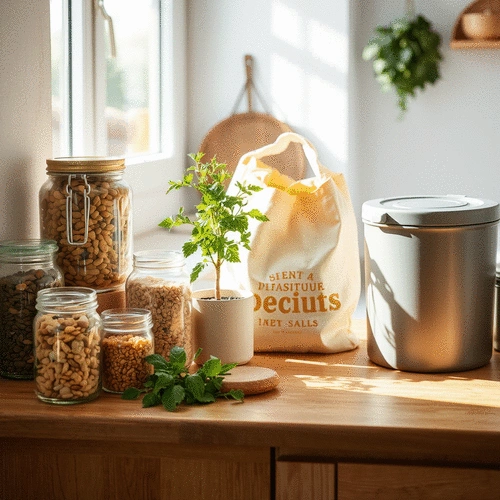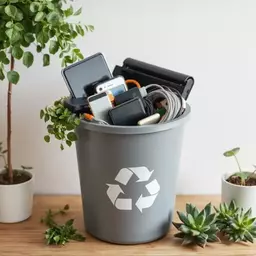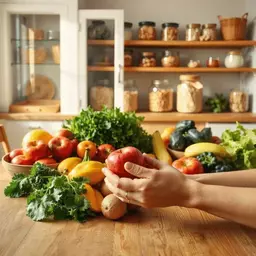In a world filled with convenience and waste, the concept of a zero-waste kitchen stands out as a beacon of sustainability. As more people become aware of their ecological footprints, transforming our kitchens into zero-waste spaces isn't just beneficial—it's essential for the planet's future.
What You Will Learn
- Understanding the core principles of a zero-waste kitchen: reduce, reuse, and recycle.
- Environmental benefits, including reduced waste in landfills and decreased pollution from single-use plastics.
- Financial savings achieved by minimizing food waste and making conscious purchases.
- The role of minimalism in promoting intentional living and decluttering your cooking space.
- Practical tips like meal planning, composting, and using reusable containers to foster sustainable habits.
- Insights from Bea Johnson on embracing the zero-waste lifestyle through the "5 R's" principle.
- Strategies for gradual adoption of zero-waste practices, making sustainability manageable and enjoyable.
- The importance of conscious consumerism and ethical sourcing in reducing environmental impact.
Core Strategies for a Zero-Waste Kitchen
Implementing strategies for a sustainable kitchen can significantly reduce waste and promote eco-friendly living. Here are the key principles to consider. For more insights on general waste reduction, check out our eco-friendly junk removal guide.
Reduce Food Waste
Plan meals ahead of time to minimize leftovers and use up perishables.
Reuse Containers
Opt for reusable bags and containers instead of single-use plastics.
Recycle Materials
Recycle glass, paper, and metal whenever possible to reduce landfill waste.
Compost Food Scraps
Implement a composting system to make use of organic waste and nourish the soil.
Buy in Bulk
Choose seasonal produce and buy in bulk to minimize packaging waste.
Preserve Food
Utilize food preservation techniques like freezing or pickling to extend shelf life.
Understanding the Concept of a Zero-Waste Kitchen for Sustainable Living
The idea of a Zero-Waste Kitchen revolves around minimizing waste within our food preparation and consumption processes. Essentially, it’s about making conscious choices that lead to as little trash as possible. By embracing this concept, we can significantly reduce our ecological footprints and contribute to a healthier planet!
Transitioning to a zero-waste lifestyle not only benefits the environment but also promotes a greater sense of mindfulness in our daily habits. It calls for a shift in perspective, where we become aware of the waste we generate and actively seek ways to eliminate it. This transformation can be truly empowering, as we learn to appreciate the resources we have and use them more responsibly. For more ideas on living mindfully, explore our tips for mindful consumption for sustainable living.
Defining Zero-Waste Kitchen and Its Environmental Importance
A Zero-Waste Kitchen aims to keep food waste out of landfills by focusing on three main principles: reducing, reusing, and recycling. The goal is to ensure that all materials used in the kitchen serve a purpose, ultimately leading to a minimal waste output. Not only does this approach help in conserving resources, but it also aids in combating climate change by decreasing methane emissions from landfills!
One of the most significant environmental benefits is the reduction of single-use plastics that often end up polluting our oceans and harming wildlife. By adopting zero-waste practices, we can minimize our contribution to pollution and inspire others to do the same. It's about creating a ripple effect of positive change!
- Reduce food waste by planning meals ahead of time.
- Reuse containers and bags instead of opting for disposable items.
- Recycle materials such as glass, paper, and metal whenever possible.
The Benefits of Embracing a Zero-Waste Lifestyle
Embracing a zero-waste lifestyle offers numerous perks! For starters, it can lead to significant financial savings. By reducing food waste and carefully planning purchases, you’ll notice a smaller grocery bill over time, making it a win-win for both your wallet and the planet!
Additionally, adopting zero-waste practices fosters creativity and resourcefulness. You might find yourself experimenting with new recipes or finding unique ways to repurpose items you already have at home. This journey not only strikes a balance between sustainability and practicality but encourages a deeper connection with what we consume. To further enhance your commitment, consider adopting easy eco-friendly habits to start.
- Financial savings from reduced grocery expenses.
- Enhanced creativity through resourceful cooking and repurposing.
- A sense of accomplishment from making eco-friendly decisions.
Insights from Bea Johnson on Zero-Waste Living
Bea Johnson, a pioneer in the zero-waste movement, offers incredible insights into how we can all adopt this lifestyle. Her book, "Zero Waste Home," serves as an excellent guide, filled with practical tips for reducing waste. Bea emphasizes that it’s not about perfection but progress—every small step counts!
One of her core ideas is the "5 R's" of zero waste: Refuse, Reduce, Reuse, Recycle, and Rot. By following these principles, we can simplify our lives while making a meaningful impact. It’s a philosophy that resonates with me and aligns perfectly with our mission at Eco Habits Daily. Together, we can create a more sustainable future!
Minimalism and Its Role in a Zero-Waste Kitchen
Minimalism plays a vital role in achieving a zero-waste kitchen. It encourages us to evaluate what we truly need and to let go of excess items that do not serve a purpose. This not only declutters our physical space but also our mental space, allowing us to focus on sustainable practices!
By adopting a minimalist approach, we can streamline our cooking processes and reduce the likelihood of waste. If you haven’t used an item in the past year, consider donating or recycling it instead of letting it gather dust. It’s amazing how opening up space in our kitchens can lead to more intentional and mindful living.
- Evaluate kitchen items and keep only what you need.
- Donate or recycle unused tools and appliances.
- Focus on quality over quantity when purchasing kitchen products.
Quick Summary
Here's a brief recap of the key points discussed so far:
- The concept of a Zero-Waste Kitchen focuses on minimizing waste through conscious choices.
- Key practices include reducing food waste, reusing containers, and recycling materials.
- Adopting a zero-waste lifestyle can lead to financial savings, increased creativity in cooking, and a deeper connection with food.
- Bea Johnson's "5 R's" (Refuse, Reduce, Reuse, Recycle, and Rot) serve as foundational principles for sustainable living.
Frequently Asked Questions About Zero-Waste Kitchens
Here are some common questions about transitioning to a zero-waste kitchen:
- What is a zero-waste kitchen?
- A zero-waste kitchen focuses on minimizing waste from food preparation and consumption by practicing the principles of reduce, reuse, and recycle. The goal is to send as little as possible to landfills.
- What are the main benefits of a zero-waste kitchen?
- The main benefits include reducing your environmental footprint, saving money on groceries, fostering creativity in cooking, and promoting a more mindful and sustainable lifestyle.
- How can I start transitioning to a zero-waste kitchen?
- Start gradually by replacing single-use items with reusable alternatives, planning meals to reduce food waste, implementing a composting system, and buying in bulk to minimize packaging.
- Who is Bea Johnson and what are her "5 R's"?
- Bea Johnson is a pioneer in the zero-waste movement and author of "Zero Waste Home." Her "5 R's" are: Refuse what you don't need, Reduce what you do need, Reuse what you consume, Recycle what you cannot refuse, reduce or reuse, and Rot (compost) the rest.
- How does minimalism relate to a zero-waste kitchen?
- Minimalism encourages evaluating what you truly need and decluttering excess items. In a zero-waste kitchen, this means keeping only essential tools and ingredients, which helps streamline processes and reduces the likelihood of waste.
Recap of Zero-Waste Kitchen Practices for Sustainable Living
As we wrap up this exploration of creating a zero-waste kitchen, it's crucial to highlight the core strategies that can make a real difference in reducing waste. A zero-waste kitchen isn't just about saying no to plastic; it's about rethinking how we shop, cook, and consume. Implementing these practices can lead to a more sustainable lifestyle that benefits both your home and the planet!
Here are some key strategies to keep in mind:
- Embrace composting for food scraps.
- Use reusable containers instead of disposables.
- Plan meals to minimize food waste.
- Choose seasonal produce and buy in bulk to reduce packaging waste.
- Utilize food preservation techniques like freezing or pickling.
By incorporating these strategies into your daily routine, you’re not just reducing waste—you’re also fostering a more mindful approach to consumption, reflecting the principles that Eco Habits Daily champions. Remember, every small step counts! You can find more comprehensive advice on how to achieve a waste-free kitchen with our detailed tips.
Encouraging Gradual Adoption of Zero-Waste Habits
Transitioning to a zero-waste kitchen doesn’t have to happen overnight. In fact, taking things step by step can make the process more manageable and enjoyable! You might find it helpful to tackle one or two changes each week, allowing these habits to become second nature over time.
Start by focusing on:
- Replacing disposable items with reusable alternatives.
- Creating a composting system for food scraps.
- Implementing a meal planning routine to use up all ingredients.
- Learning preservation methods for seasonal fruits and vegetables.
As you make these adjustments, you might find yourself discovering new recipes or cooking techniques that resonate with your style! Remember, I’m here to support your journey at Eco Habits Daily, sharing insights to help you thrive in your sustainable lifestyle.
Taking Action Towards a Sustainable Kitchen Lifestyle
Incorporating Visual and Interactive Content for Engagement
As we embark on this journey to a zero-waste kitchen, engaging content can inspire you even further! At Eco Habits Daily, I love sharing practical tips through visuals and interactive materials. Whether it's infographics that break down meal planning or videos demonstrating composting techniques, these resources can make learning more enjoyable and effective!
Consider exploring:
- Step-by-step guides on creating a compost bin.
- Meal prep videos showcasing zero-waste recipes.
- Infographics illustrating the impact of food waste.
- Checklists for transitioning to reusable products.
These engaging formats not only make information more digestible but also spark excitement about adopting zero-waste practices. It’s a wonderful way to visualize the positive impact of your choices!
Call to Action: Start Your Journey to a Zero-Waste Kitchen Today
Now is the perfect time to take action! Don’t wait for the "right moment." Every day is an opportunity to make greener choices that benefit your kitchen and our planet. I encourage you to begin your zero-waste journey today.
Take the first step by:
- Choosing one zero-waste practice to adopt this week.
- Joining a local zero-waste group or online community for support.
- Sharing your journey on social media to inspire others!
- Exploring recipes and resources on Eco Habits Daily for more ideas.
Remember, every small action contributes to a healthier planet, and it’s absolutely worth celebrating the progress you make!
Embracing Conscious Consumerism and Ethical Sourcing
As part of your zero-waste kitchen journey, embracing conscious consumerism can significantly enhance your impact. This means being mindful about not just what you buy, but also where it comes from and how it’s produced. Opting for ethical sourcing practices not only helps reduce waste but also supports fair labor practices and sustainable agriculture. Learn more about mindful shopping for less waste.
Some effective strategies include:
- Choosing local produce to reduce transportation waste.
- Supporting brands that prioritize sustainability.
- Researching products to ensure they’re eco-friendly and ethically made.
- Shopping at farmers' markets or in bulk to minimize packaging.
By making these choices, you help foster a market that values sustainability and ethical practices. Together, we can drive change and inspire others to join us on this exciting journey toward a more sustainable lifestyle!
Recap of Key Points
Here is a quick recap of the important points discussed in the article:
- Adopt a Zero-Waste Kitchen by focusing on reducing, reusing, and recycling to minimize waste.
- Plan meals effectively to reduce food waste and save on grocery expenses.
- Utilize composting for food scraps, enhancing sustainability.
- Embrace minimalism by keeping only necessary kitchen items and donating or recycling the rest.
- Engage in conscious consumerism by choosing local and sustainably sourced products.
- Incorporate food preservation techniques like freezing or pickling to extend the life of ingredients.
- Make gradual changes to zero-waste practices, focusing on one or two habits at a time.










